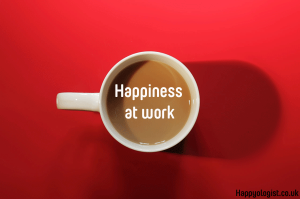100,000 hours. 6,000,000 minutes. 360,000,000 seconds. That is roughly the time of our life that we spend at work. And research shows, that work is one of the places where we are least happy: only commuting is worse. And people prefer to be in company of others (friends, relatives, customers) over being alone, with only one exception: people are rather alone, than with their boss.
But should it really be like this? What if we were happy for all those 100,000 hours?
Today and next week, I would like to talk about happiness at work. Today, I’ll talk about your personal happiness at the work floor. And next week, I’ll speak about the implications of higher happiness levels for companies.
A potential source of happiness
Not many people think of work as a potential source of happiness. In this conception, work and private life are two closely separated areas. In our private life, we go for drinks with friends, lay as couch potatoes watching TV and travel to Southern France. Our job is separate part of our lives, where we earn the money needed to pays those drinks, couches and TVs, and trips.
But a stimulating job can be a source of flow, of pride, and of happiness. Recently, more and more companies are taking up the challenge. One of the inspirations was American shoe retailer Zappos. For Zappos, happiness is a part of the firm identity. Founder Tony Hsieh wanted to be the retailer with the highest customer satisfaction. To do so, he believed he had to reach a high level of job satisfaction for his employees. That means many fun events and freedom on the job, and HR policies that are shaped by a Chief Happiness Officer. You can find it cheesy, but it seems that it works.
A happy employee is a happy partner
What you are experiencing at work, doesn’t only matter those eight (or nine) hours behind you desk. People typically take their emotional state from work home. A study found a link between work engagement and vigor of an employee at the end of their working day and their happiness level before going to sleep. And not only their own happiness: the effect even crossed over to their partner. The happier an employee, the higher the happiness level of their partner on the same day!
How can I increase my happiness?
You might be wondering: how can I increase my happiness at work? Honestly: I don’t know. You are the only master of your happiness. You might have some intuitive ideas how you could find happiness in the work place. That’s probably where I would start. But let me give you a hint where the answer could be.
During my Commission traineeship almost three years ago, I had a time when I was wondering about my career: where would I end up? What would I do? How would I know it would be right place for me? At one of the career-building events, the speaker referred to a TED speaker Dan Pink. His case is that as industrial times are over, post-modern jobs require a new set of skills. Creativity and flexibility become a lot more important than those during the time a worker followed orders and worked along an assembly line.
Autonomy, mastery and purpose
In this new era, what motivates us to work? Three factors, argues Dan Pink: autonomy, mastery and purpose. Autonomy: freedom in how tackle your challenges. Mastery: getting better and better. Purpose: doing something with a bigger meaning. I think he is right. And when I contemplate my job, and others I would be willing to do, I ask myself whether they do provide these aspects. When searching for happiness at work, aim to find a place that offers you autonomy, mastery, and purpose.




